Serving 276 students in grades Kindergarten-5, Robertson School ranks in the top 50% of all schools in Rhode Island for overall test scores (math proficiency is top 50%, and reading proficiency is top 50%).
The percentage of students achieving proficiency in math is 30-34% (which is higher than the Rhode Island state average of 27%). The percentage of students achieving proficiency in reading/language arts is 30-34% (which is approximately equal to the Rhode Island state average of 33%).
The student:teacher ratio of 15:1 is higher than the Rhode Island state level of 13:1.
Minority enrollment is 32% of the student body (majority Hispanic), which is lower than the Rhode Island state average of 49% (majority Hispanic).
Quick Stats (2025)
- Grades: Kindergarten-5
- Enrollment: 276 students
- Student:Teacher Ratio: 15:1
- Minority Enrollment: 32%
- Overall Testing Rank: Top 50% in RI
- Math Proficiency: 30-34% (Top 50%)
- Reading Proficiency: 30-34% (Top 50%)
- Science Proficiency: 20-29% (Btm 50%)
- Source: National Center for Education Statistics (NCES), RI Dept. of Education
Top Rankings
Robertson School ranks among the top 20% of public schools in Rhode Island for:
Category
Attribute
Most improved public schools
School Overview
Robertson School's student population of 276 students has declined by 5% over five school years.
The teacher population of 18 teachers has grown by 12% over five school years.
Grades Offered
Grades Kindergarten-5
Total Students
276 students
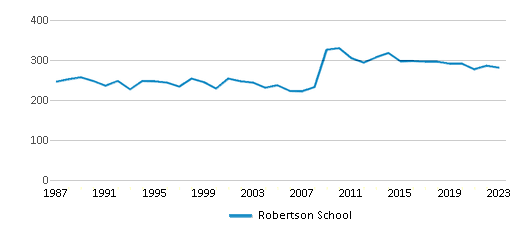
Gender %
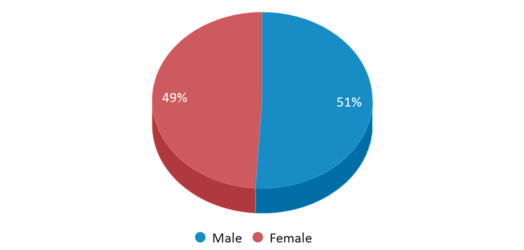
Total Classroom Teachers
18 teachers
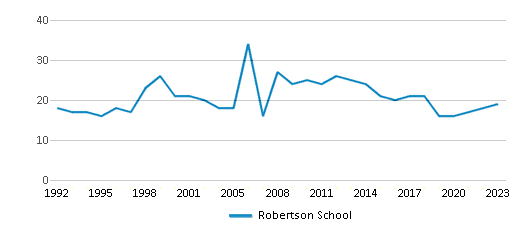
Students by Grade
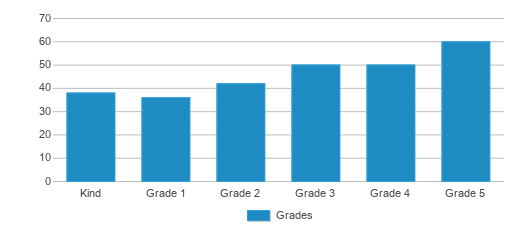
School Rankings
Robertson School ranks within the top 50% of all 289 schools in Rhode Island (based off of combined math and reading proficiency testing data).
The diversity score of Robertson School is 0.51, which is less than the diversity score at state average of 0.65. The school's diversity has stayed relatively flat over five school years.
Overall Testing Rank
#126 out of 289 schools
(Top 50%)
(Top 50%)
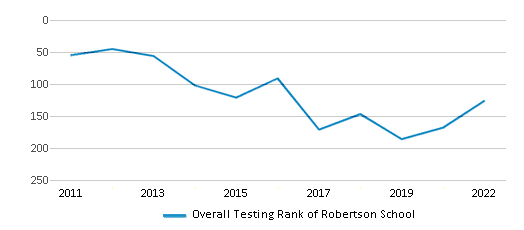
Math Test Scores (% Proficient)
30-34%
27%
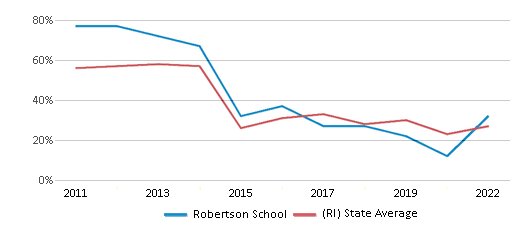
Reading/Language Arts Test Scores (% Proficient)
30-34%
33%
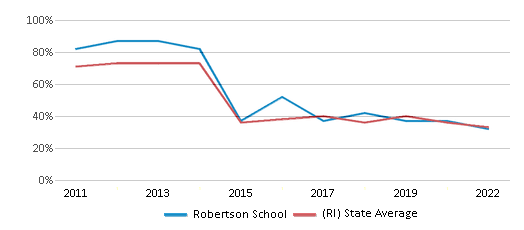
Science Test Scores (% Proficient)
20-29%
31%
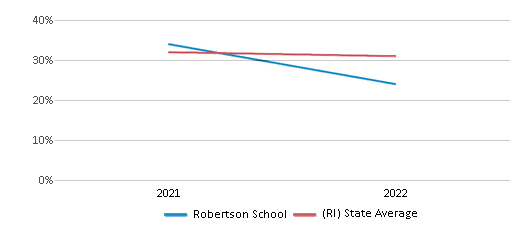
Student : Teacher Ratio
15:1
13:1
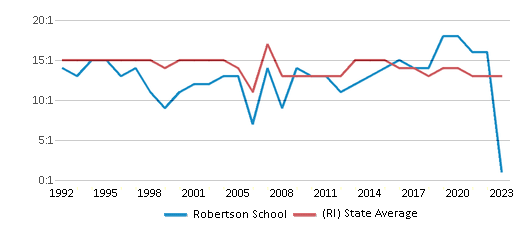
American Indian
n/a
1%
Asian
6%
4%
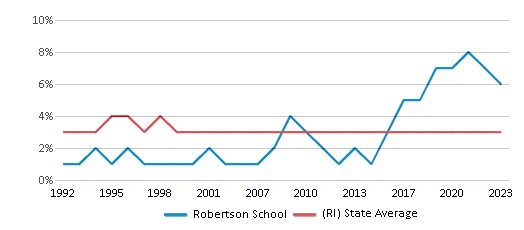
Hispanic
14%
30%
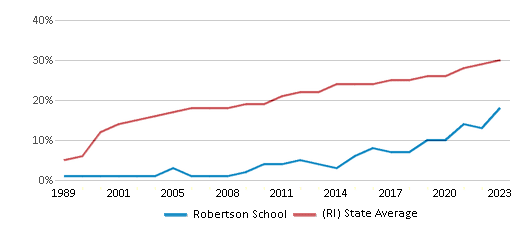
Black
4%
9%
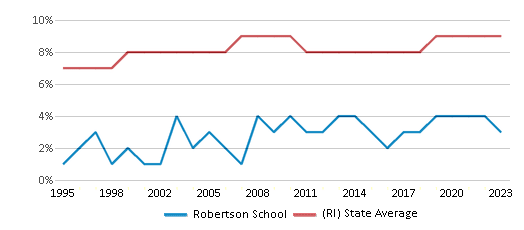
White
68%
51%
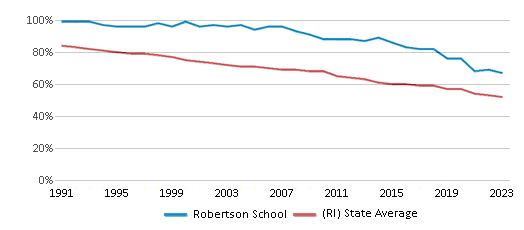
Hawaiian
n/a
n/a
Two or more races
8%
5%
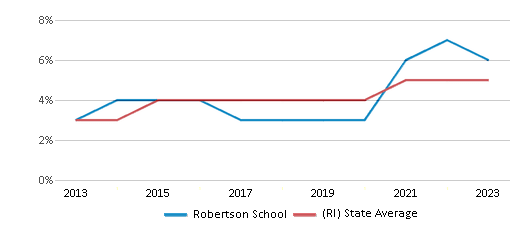
All Ethnic Groups
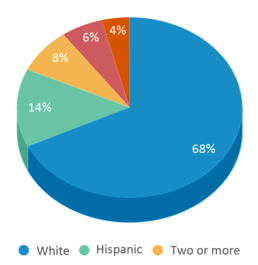
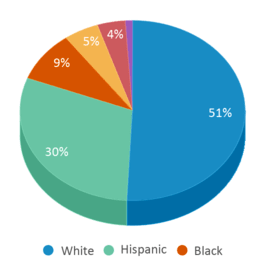
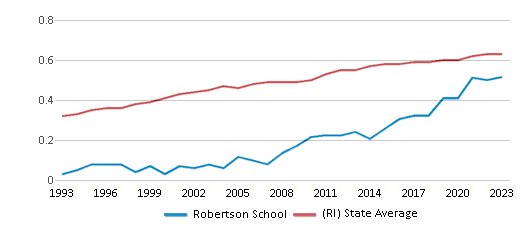
Participates in the National School Lunch Program (NSLP)
Yes
Eligible for Free Lunch
30%
38%
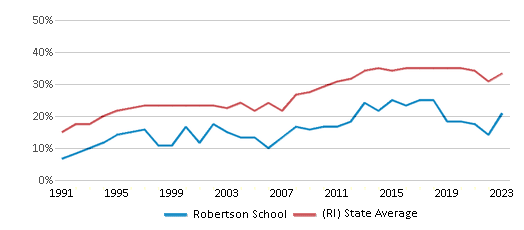
Eligible for Reduced Lunch
8%
6%
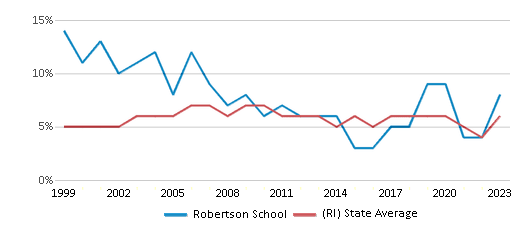
School Statewide Testing
School District Name
Source: National Center for Education Statistics (NCES), RI Dept. of Education
Profile last updated: 02/09/2025
Frequently Asked Questions
What is Robertson School's ranking?
Robertson School is ranked #126 out of 289 schools, which ranks it among the top 50% of public schools in Rhode Island.
What schools are Robertson School often compared to?
Robertson Schoolis often viewed alongside schools like Park School by visitors of our site.
What percent of students have achieved state testing proficiency in math and reading?
30-34% of students have achieved math proficiency (compared to the 27% RI state average), while 30-34% of students have achieved reading proficiency (compared to the 33% RI state average).
How many students attend Robertson School?
276 students attend Robertson School.
What is the racial composition of the student body?
68% of Robertson School students are White, 14% of students are Hispanic, 8% of students are Two or more races, 6% of students are Asian, and 4% of students are Black.
What is the student:teacher ratio of Robertson School?
Robertson School has a student ration of 15:1, which is higher than the Rhode Island state average of 13:1.
What grades does Robertson School offer ?
Robertson School offers enrollment in grades Kindergarten-5
What school district is Robertson School part of?
Robertson School is part of Warwick School District.
School Reviews
5 2/17/2024
This is the BEST school I have ever been. As a student there is NO school that can beat it. 3rd grade is obviously the best grade here. The teachers were so nice and kind, the events were so cool and fun, that I loved school and when I was there I was like I don''t understand why kids hate school. This is SO fun I love school. Kindergarten was really fun too. Thanks to this school, I grew up smart. But sadly, at the end of school in 3rd grade I had to move to New York instead of Rhode Island and I was really sad because I didnt want to leave my old school and and my teachers and my best friends, but I went. Anyways il give examples of the events there. Free ice cream, An event where we learn about reptiles and we actually got to touch a snake named Miles long. jump on bounce houses for FREE. watch the Mario Movie for free (even tho some schools you need to pay to watch a movie for free) Making our own books. Making google slide presentations in art and library class. It also has a playground. (even tho my new school is NY only has a small playground only for the younger kids) And many more cool events and things. So thats why this is the best school on earth.
Review Robertson School. Reviews should be a few sentences in length. Please include any comments on:
- Quality of academic programs, teachers, and facilities
- Availability of music, art, sports and other extracurricular activities
Recent Articles

What Is A Charter School?
Explore the world of charter schools in this comprehensive guide. Learn about their history, how they operate, and the pros and cons of this educational innovation. Discover key facts about charter schools, including admission policies, demographics, and funding, as well as what to look for when considering a charter school for your child.

10 Reasons Why High School Sports Benefit Students
Discover the 10 compelling reasons why high school sports are beneficial for students. This comprehensive article explores how athletics enhance academic performance, foster personal growth, and develop crucial life skills. From improved fitness and time management to leadership development and community representation, learn why participating in high school sports can be a game-changer for students' overall success and well-being.

February 05, 2025
Understanding the U.S. Department of Education: Structure, Impact, and EvolutionWe explore how the Department of Education shapes American education, from its cabinet-level leadership to its impact on millions of students, written for general audiences seeking clarity on this vital institution.









